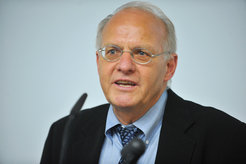Directors Emeriti of the Max Planck Institute for Human Development
Since it was founded in 1963, several generations of Directors have led the Max Planck Institute for Human Development. Currently, four former Directors are active at the Institute: Jürgen Baumert, Wolfgang Edelstein, Karl Ulrich Mayer and Gerd Gigerenzer. This section provides an insight into their current projects and roles. More information on the Institute’s history and a chronology are available at the page history of the Institute.
Jürgen Baumert

Prof. Dr. Jürgen Baumert was Director of the Center for Educational Research from 1996 to 2010. Since his transition to Emeritus status, he has taken on a number of consultancy roles – for example, for the German federal government, federal states, and several research institutes and foundations. At the same time, he continues to work on research projects with collaborative partners. For example, the Berlin Study is evaluating the transition of secondary education in Berlin to a two-track system. The study was initiated in consultation with the federal government and the 16 federal states and was run as part of the pilot study for PISA-2012 and PISA-2015. The study is being conducted in collaboration with the Leibniz Institute for Science and Mathematics Education in Kiel and the German Institute for International Educational Research (DIPF) in Frankfurt/Berlin. The longitudinal component of the Berlin Study is linked to the ongoing longitudinal BIJU study on Learning Processes, Educational Careers, and Psychosocial Development in Adolescence and Young Adulthood, resulting in a multi-cohort design. This work is being conducted in cooperation with the DIPF and research partners at the University of Michigan in Ann Arbor (USA). Moreover, Jürgen Baumert is collaborating with the Institute of Psychology at the University of Kiel and the Leibniz Institute for Science and Mathematics Education in evaluating the bilingual State Europe Schools of Berlin.
Wolfgang Edelstein (*1929 — †2020)

Prof. Dr. Wolfgang Edelstein was Director of the Center for Development and Socialization from 1981 to 1997. The aim of his research was to elucidate, from an intercultural perspective, how the development of social inequality interacts with cognitive and socio-moral personality development from childhood to adulthood. Since his transition to Emeritus status in 1997, his work has focused on the development of democratic schools and pro-democracy projects: in 1998–2006 as a member of the Board of Scientific Advisors of the Brandenburg Gate Foundation, responsible for organizing the program “Youth Takes Responsibility”; from 2002–2007 Wolfgang Edelstein was a member of the Coordinating Committee of the model program “Learning Democracy in School” supported by the Joint Commission of the Federal Government and the State Ministries of Education (BLK); and in 2005 he co-founded the German Association for Democratic Education, which he chaired until 2011. From 2011, he was involved in the development of the continuing education Master’s program “School Development in Line with Teaching of Democratic Principles and Social Skills” at the FU Berlin. In 2009 he received the Hildegard Hamm Brücher Award for Democracy Education and in 2012, the Theodor Heuss Award “Education – Participation – Living Democracy.” In the new millennium, Wolfgang Edelstein has published a number of works on right-wing extremism, especially extreme right-wing youth culture, as well as essays and analyses on the development of democracy in schools.
Ute Frevert

Prof. Dr. Dr. h.c. Ute Frevert was Director of the Center for the History of Emotions from 2008 to 2024. Its research was based on the premise that emotions – feelings and their expression – are culturally shaped and socially learned.
She was Professor of German History at Yale University from 2003 to 2007, having previously taught at the Universities of Konstanz, Bielefeld and Berlin (Freie Universität). She is a member of the German National Academy of Sciences Leopoldina, the Berlin-Brandenburg Academy of Sciences and Humanities, and corresponding fellow of the British Academy. Ute Frevert was awarded the prestigious Leibniz Price in 1998 and received the Order of Merit of the Federal Republic of Germany in 2016. She was granted an honorary doctorate from the University of Tampere (Finland) in 2018. In 2020, Ute Frevert was honoured with the Sigmund Freud Prize for Scientific Prose for her groundbreaking work on social and gender history and the history of emotions.
Since 2023 Ute Frevert heads the Max Weber Foundation, a legal entity closely linked to the German Federal Government located in Bonn. It comprises eleven humanities research institutes. The Foundation’s goal is to promote research with a focus on history, culture, and the economic and social sciences in selected countries and to foster mutual understanding between Germany and the respective host countries.
Gerd Gigerenzer

Prof. Dr. Gerd Gigerenzer was Director of the Adaptive Behavior and Cognition Center from 1997 to 2017. His research group investigated the rationality of simple decision rules (heuristics) that can be applied to complex domains such as medicine, finance, and the law. Previously he was director at the Max Planck Institute for Psychological Research in Munich, Professor of Psychology at the University of Chicago and John M. Olin Distinguished Visiting Professor, School of Law at the University of Virginia. Gigerenzer is vice president of the European Research Council (ERC), member of the German Academy of Sciences and the Berlin-Brandenburg Academy of Sciences, and honorary member of the American Academy of Arts and Sciences and the American Philosophical Society. Awards for his work include the AAAS Prize for the best article in the behavioral sciences, the Association of American Publishers Prize for the best book in the social and behavioral sciences, the German Psychology Award, and the Communicator Award of the German Research Foundation. He has trained U.S. federal judges, German physicians, and top international managers in decision making and understanding risks and uncertainties. The Swiss Duttweiler Institute has distinguished Gigerenzer as one of the top-100 Global Thought Leaders worldwide. As director of the Harding Center for Risk Literacy, which was founded in 2009, and partner of Simply Rational – The Institute for Decisions, his current research focuses on risk literacy and risk communication.
Karl Ulrich Mayer

Prof. Dr. Karl Ulrich Mayer was Director of the Center for Sociology and the Study of the Life Course from 1983 to 2005. After his transition to Emeritus status, he taught at Yale University in New Haven/CT, USA, until 2010, where he was Chair of the Department of Sociology and Founding Director of the Center for Research on Inequalities and the Life Course (CIQLE). He is Stanley B. Resor Emeritus Professor of Sociology. From 2010 to 2014 Karl Ulrich Mayer was President of the Leibniz Association. Since 2010 he has been a member of the Scientific Advisory Board of the Berlin-Brandenburg Academy of Science (BBAW) and a member of the BBAW Interdisciplinary Research Group “The Initiative for Excellence.” He is also a member of the Steering Committee “Demographic Change” of the German Academy of Natural Scientists Leopoldina and a member of the Leopoldina working group on longitudinal studies in the social sciences. In 2015, he evaluated the Institute for Advanced Studies in Vienna. Karl Ulrich Mayer continues to work on the German Life History Study (GLHS), in the context of which eight cohort studies were conducted in western Germany and six in eastern Germany between 1979 and 2005. The most recent publication, “Social Change, Cohort Inequalities in Germany Since the 1920s – Results from the German Life History Study,” appeared as a Special Edition of the European Sociological Review (April 2015). Further major research interests are the sociology and politics of science, especially the relationships between universities and non-university research organizations and institutes and the career perspectives of young scientists. Karl Ulrich Mayer is Chair of the Scientific Advisory Board of the National Report on Junior Scholars and a member of the councils of the University of Mannheim and Goethe University Frankfurt. In May 2015, he was appointed Honorary Senator of the University of Tübingen.




